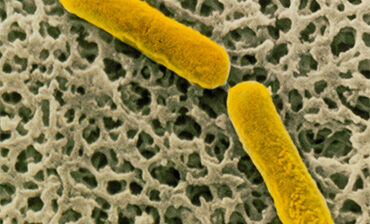Botulism

Botulism is a serious paralytic illness caused by a nerve toxin produced by the bacterium Clostridium botulinum. The disease may occur after eating foods containing the toxin or due to development of the spores within the intestine of young children or within wounds.
Food botulism is the dominating form of the disease, and paralytic symptoms generally appear after an incubation period of 12–36 hours (up to several days) after consumption of the toxin-containing food. The symptoms may be very severe, and require intensive-care treatment and the administration of an anti-toxin. Even where these are available, between 5 and 10 % of the patients die.
Due to the extremely high potency of the toxin, botulism is included among the potential bio-terrorist threats. Following laboratory accidents, the toxin has also caused symptoms on inhalation, with a substantially reduced incubation period.



